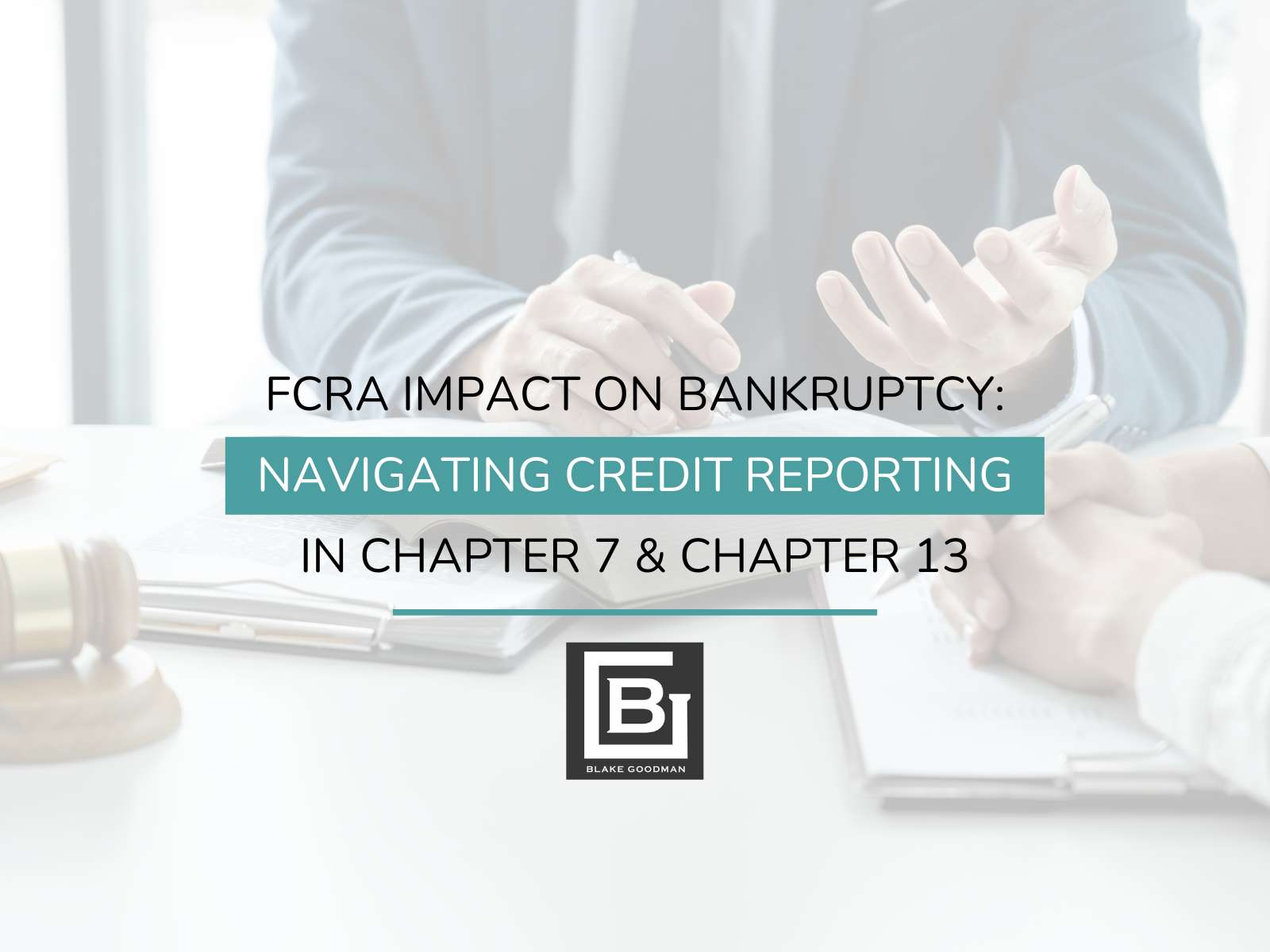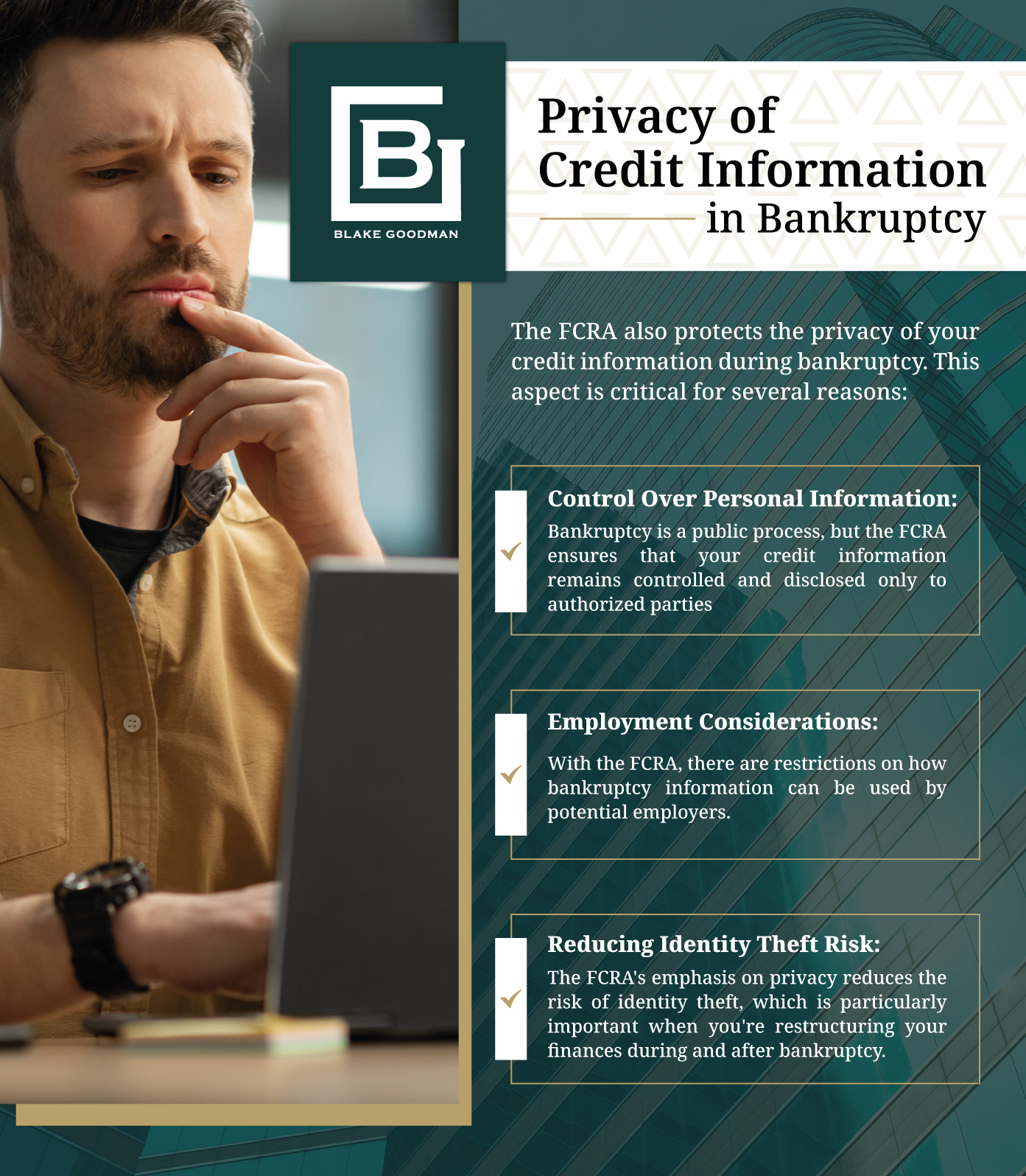How Does the FCRA Influence Credit Reporting During Bankruptcy?
The Fair Credit Reporting Act (FCRA) plays a pivotal role in safeguarding the integrity and privacy of your credit information, a matter of utmost importance, especially when dealing with bankruptcy proceedings, whether it’s Chapter 7 or Chapter 13. As a seasoned bankruptcy attorney in Honolulu, Blake Goodman offers invaluable insights into the FCRA, empowering you to manage your credit rights effectively, particularly in the nuanced context of bankruptcy.
What is the Fair Credit Reporting Act (FCRA)?

The FCRA’s Enhanced Role in Bankruptcy: Ensuring Accuracy & Privacy
The Fair Credit Reporting Act (FCRA) serves as a guardian of your credit information, playing a pivotal role during the sensitive period of bankruptcy. This legislation is not just about protecting data; it’s about ensuring fair play in the financial system, particularly when you’re in a vulnerable state like bankruptcy.
Under the FCRA, you are endowed with rights that are particularly significant in the context of Chapter 7 and Chapter 13 bankruptcy:
- Dispute and Correction: Challenge inaccuracies in your credit report, crucial for presenting a clear financial picture during bankruptcy proceedings.
- Access to Information: Annually, you’re entitled to a free credit report from each nationwide agency. This right is especially pertinent when assessing your financial standing in preparation for or during bankruptcy.
- Knowledge of Your Credit Score: While there may be a fee, understanding your credit score is vital during bankruptcy, impacting your post-bankruptcy financial rehabilitation.
- Adverse Action Notifications: Receiving detailed notices of adverse credit information is critical, especially when such information influences your bankruptcy case or financial recovery.
Here’s a deeper dive into how the FCRA influences the bankruptcy process, safeguarding your journey to financial recovery and preserving your future creditworthiness.
Ensuring Accuracy of Credit Reports During Bankruptcy
When you file for bankruptcy, whether Chapter 7 or Chapter 13, your credit report undergoes significant changes. The FCRA mandates credit reporting agencies to accurately reflect your bankruptcy status, including the listing of debts discharged or reorganized. This accuracy is crucial for several reasons:
- Post-Bankruptcy Recovery: Accurate credit reports are vital for your financial rebound post-bankruptcy. They ensure that potential lenders have the correct information, influencing their decisions on whether to extend credit.
- Consumer Trust: Maintaining accurate reports fosters trust in the credit reporting system, assuring you that your financial history is portrayed fairly.
- Dispute Resolution: The FCRA provides a framework for disputing inaccuracies on your credit report. During bankruptcy, this means you can challenge any erroneous listings related to your bankruptcy filing, such as debts that should have been marked as discharged but weren’t.
Privacy of Credit Information in Bankruptcy
The FCRA also protects the privacy of your credit information during bankruptcy. This aspect is critical for several reasons:
- Control Over Personal Information: Bankruptcy is a public process, but the FCRA ensures that your credit information remains controlled and disclosed only to authorized parties, preventing misuse or unauthorized access.
- Employment Considerations: With the FCRA, there are restrictions on how bankruptcy information can be used by potential employers. This protection is vital for your ability to secure employment and rebuild your financial life after bankruptcy.
- Reducing Identity Theft Risk: The FCRA’s emphasis on privacy reduces the risk of identity theft, which is particularly important when you’re restructuring your finances during and after bankruptcy.
Impact on Financial Recovery & Future Creditworthiness
The role of the FCRA extends beyond the bankruptcy process, influencing your long-term financial health and creditworthiness. By ensuring that your credit report reflects the true outcome of your bankruptcy case, the FCRA plays a part in your ability to recover financially, obtain future credit, and make strides toward financial stability.
Chapter 7 Bankruptcy & the FCRA
In Chapter 7 bankruptcy, your non-exempt assets are liquidated to repay creditors. The FCRA plays a significant role here:
- Accuracy in Reporting: Ensure your credit report accurately reflects discharged debts, crucial for your financial slate cleaning.
- Credit Rebuilding: Post-Chapter 7, the FCRA’s provisions help you monitor and improve your credit, essential for your fresh start.
Chapter 13 Bankruptcy & the FCRA
Chapter 13 bankruptcy involves a repayment plan over three to five years. The FCRA’s importance is evident in several aspects:
- Payment Updates: Your credit report should reflect your ongoing payments, impacting your credit score and financial standing during Chapter 13.
- Plan Completion: Upon completing the Chapter 13 plan, the FCRA aids in ensuring your credit report accurately shows your discharged debts, facilitating your financial rehabilitation.
Legal Recourse & Bankruptcy Implications

Connect with Blake Goodman for Specialized Guidance
Facing the complexities of credit reporting amidst Chapter 7 or Chapter 13 bankruptcy can be daunting. Blake Goodman is dedicated to providing you with the expert guidance necessary to navigate these challenges. Understanding your rights under the FCRA can significantly impact your bankruptcy process and your journey to financial recovery.
If you’re grappling with credit reporting issues or considering bankruptcy options, Blake Goodman is here to help. With a deep understanding of both the FCRA and bankruptcy laws in Hawaii, our firm is well-equipped to support you in protecting your financial interests and paving the way to a stable financial future. Contact our office for a detailed consultation and take a proactive step toward understanding and exercising your credit rights in the realm of bankruptcy.

Email: blake@debtfreehawaii.com
Website: https://www.debtfreehawaii.com/
HONOLULU OFFICE
900 Fort Street MallSuite 910
Honolulu, HI 96813
Phone: (808) 517-5446
AIEA OFFICE
98-1238 Ka'ahumanu StSuite 201
Pearl City, HI 96782
Phone: (808) 515-3441
KANEOHE OFFICE
46-005 Kawa StSuite 206
Kaneohe, HI 96744
Phone: (808) 515-3304
MAUI OFFICE
Our location has moved from
300 Ohukai RdSuite B317
Kihei, HI 96753
Phone: (808) 515-2037
to
220 Imi Kala St. #203B
Wailuku, HI 96793

Blake Goodman received his law degree from George Washington University in Washington, D.C. in 1989 and has been exclusively practicing bankruptcy-related law in Texas, New Mexico, and Hawaii ever since. In the past, Attorney Goodman also worked as a Certified Public Accountant, receiving his license form the State of Maryland in 1988.


